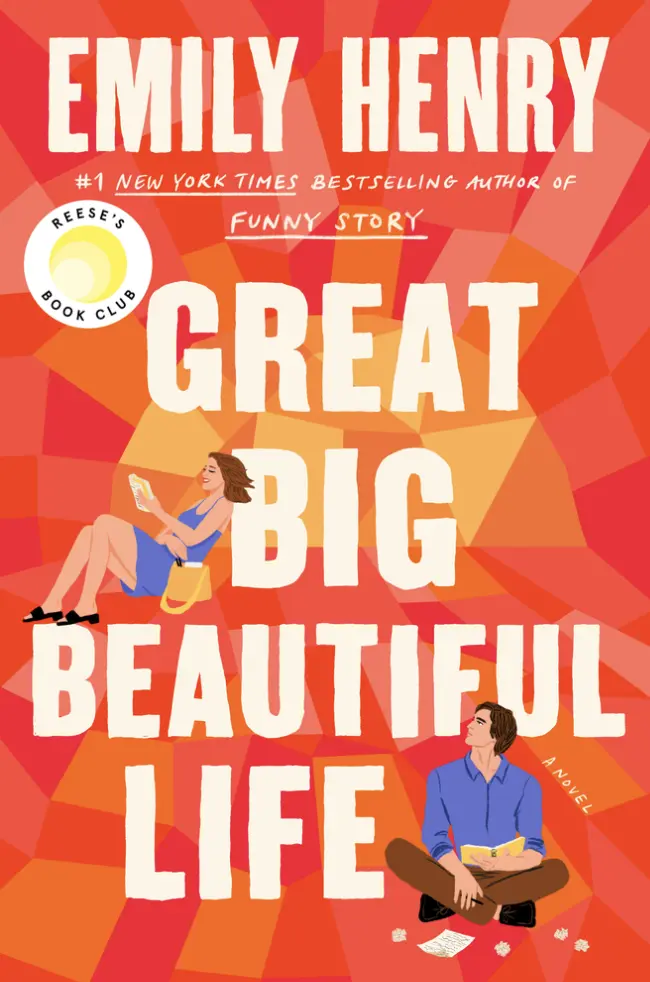
By Emma Barhydt
“From before my first breath, there were two distinct Margaret Iveses. There was me, and then there was the other one, the one who belonged to the public.”
With Great Big Beautiful Life, Emily Henry doesn’t pivot — she expands. This novel isn’t about reinvention. It’s about evolution. Henry, already beloved for her wit, warmth, and whip-smart banter, steps fully into her range as a storyteller here, crafting a novel that’s looser in form, deeper in feeling, and undeniably more ambitious than anything she’s written before.
Gone are the tidy arcs and comfortingly familiar structures of her earlier romances — not that there’s anything wrong with those (God bless a well-executed enemies-to-lovers). But GBBL is after something more expansive. It’s part fictional memoir, part emotional excavation, part literary drama, and yes, still a love story — though not always in the way you might expect.
It reads, at times, like a celebrity memoir — think Paris Hilton, Julia Fox, or Britney Spears. That same mix of glitz and trauma, self-awareness and self-protection. But filtered through Henry’s voice, it becomes something literary, layered, and arrestingly personal.
“There’s an old saying about stories, and how there are always three versions of them: yours, mine, and the truth.”
At the center of it all is Alice, a woman shaped by public perception, family mythology, and her own shifting sense of self. Her voice is magnetic — sharp, sad, funny, flawed — the kind of narrator who tells you the truth even when she’s still figuring it out herself. The narrative unspools like memory: non-linear, confessional, raw in places and poetic in others.
“Love isn’t something you can cup in your hands, and I have to believe that means it’s something that can’t ever be lost.”
What emerges is a meditation on grief, fame, inheritance, and womanhood — told with a clarity that’s sometimes painful, often beautiful, and always deeply felt. The emotional beats are quieter than in Henry’s past work, but no less resonant. She’s writing not for plot satisfaction, but for emotional precision.
“Life is so complicated. And I think it’s human nature to try to untangle those complications. We want everything to make sense. And that’s okay. It’s a worthy pursuit.”
The novel’s emotional register is nuanced and bittersweet. It doesn’t push for catharsis. Instead, it allows space for contradiction: the father you loved and resented. The person you were and the one the world thought you were. The story you were given, and the one you’re trying to write now.
“With writing, you could always add more. More, more, more until you got to the heart of a thing, and after that, you could chip away the excess.”
What’s most impressive is how much GBBL trusts its reader. It’s not trying to impress you or wrap anything in bows. It gives you raw, real things — contradictory feelings, complicated family dynamics, murky morality — and invites you to hold them all at once. This is Henry writing with emotional precision and narrative patience.
This is a book about value — of art, of self, of connection. It reads like a love letter to those trying to reclaim their own narrative, one awkward conversation and uncomfortable truth at a time. And in the background of all that personal reckoning, there’s a slow-burning romantic subplot that absolutely simmers when it wants to.
“I want to be with you. Nothing else is going to matter to me more than that. Not at the end of my life. Not even now.”
The love story here doesn’t sweep you off your feet. It sits down beside you and takes your hand. It builds slowly, built on trust and mutual recognition — on showing up, not performing. It’s one of Henry’s most mature and emotionally satisfying relationships to date.
There’s a generosity at the heart of this novel. It welcomes complexity. It embraces imperfection. It offers no clean answers, only the promise that showing up — broken, complicated, human — is enough.
Is Great Big Beautiful Life Emily Henry’s best novel? I think so. It’s not about proving anything — it’s about embracing everything: the messy, unglamorous, gorgeous sprawl of a life fully lived.
“I welcome her to this great big beautiful life.”

